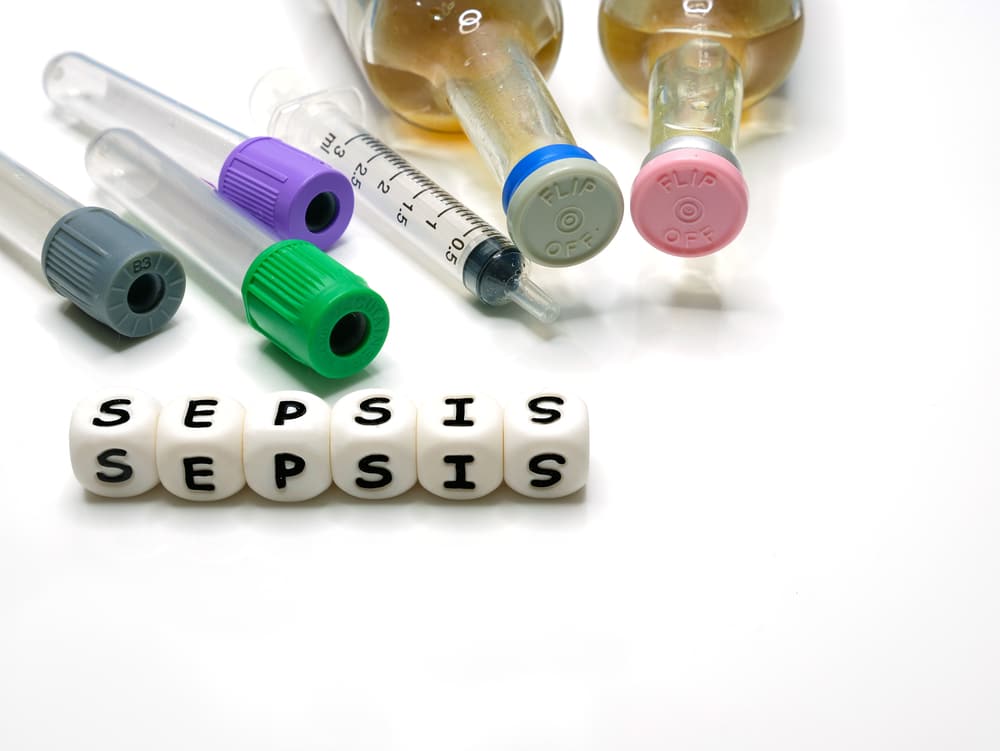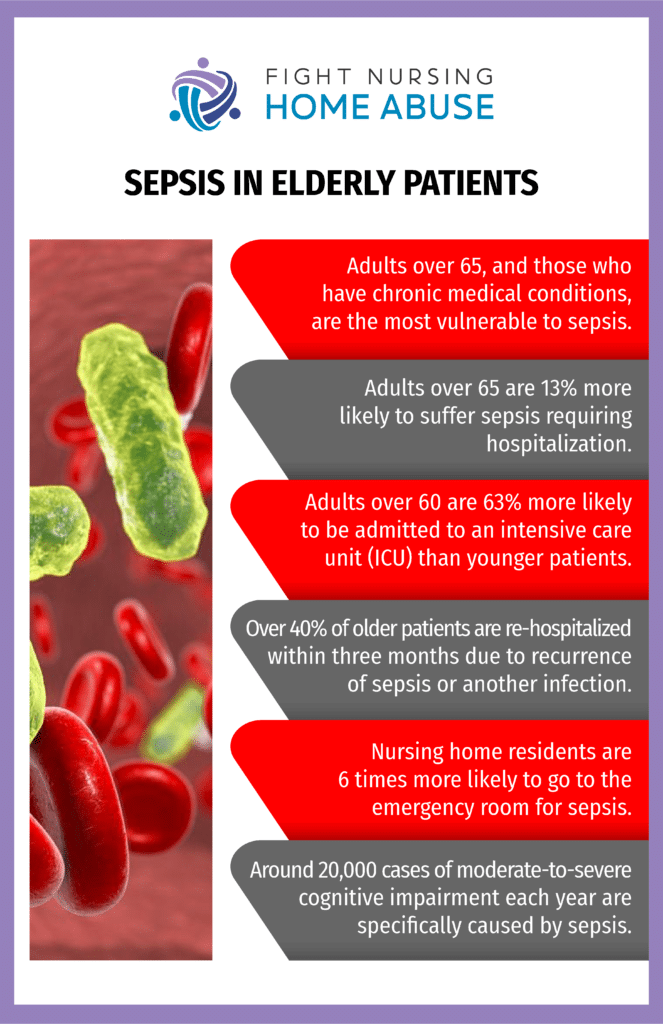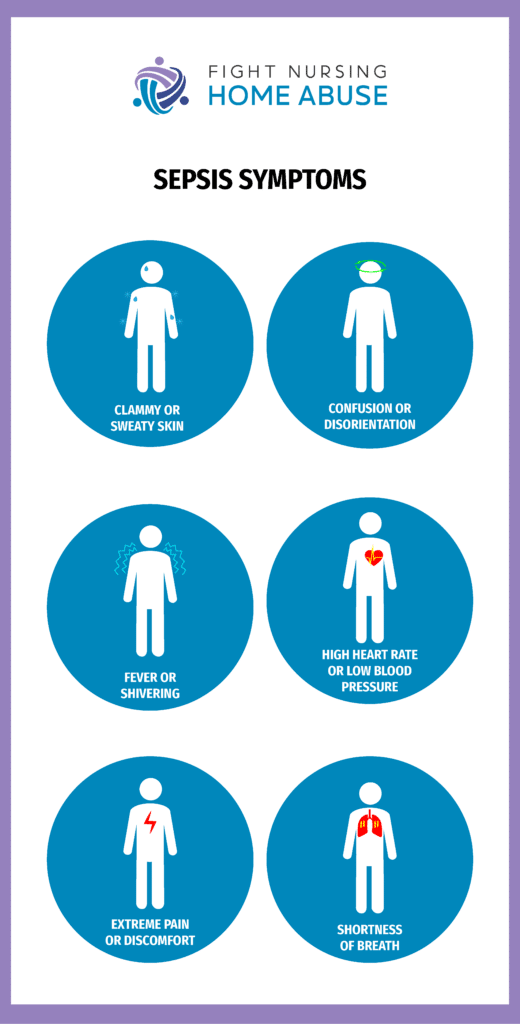Sepsis

Sepsis is a serious medical condition that poses a great threat to nursing home residents. If not treated immediately, sepsis can result in severe illness or even death. Caregivers and family members should be aware that sepsis can be a warning sign of nursing home neglect or abuse.
Learn how to recognize sepsis and the factors that cause it and contribute to its worsening. Understanding how to prevent and combat sepsis can help you improve or even save the life of a vulnerable adult in nursing home care.
If you have witnessed or experienced sepsis in nursing homes, call Fight Nursing Home Abuse at 1-866-548-9636. There may be compensation available to aid in treatment and prevention.
What is Sepsis?
Sepsis is a potentially life-threatening condition that can occur when your body is fighting a bacterial, viral or fungal infection. When you have an infection, your body responds by releasing chemicals into your bloodstream to fight it. When those chemicals are out of balance or overwhelm your body, sepsis can develop. The result is serious illness that can damage your organs.
Reduced blood flow to vital organs such as your heart, brain or kidneys can impair their ability to function properly. Severe sepsis can cause blood clots to form in organs and extremities, increasing the risk of stroke, embolism, gangrene and organ failure.
Without immediate intervention and appropriate treatment, sepsis can evolve into septic shock. Extremely low blood pressure caused by septic shock can result in death.
Statistics about Sepsis
According to the Centers for Disease Control and Prevention (CDC), each year:
- 1.7 million adults develop sepsis
- Most at risk are adults over 65 years of age.
- Almost 270,000 people die of sepsis.
- 1 in 3 hospital patients have sepsis.
- Sepsis can develop in patients with viral infections, bacterial infections, and fungal infections.
- Treating infections properly is the best way to prevent severe sepsis.
Who is Most At Risk?
Sepsis in nursing homes is not uncommon as residents typically have more risk factors than the general public. However, sepsis can happen to anyone.

Those most at risk include:
- Elderly people
- Pregnant women
- Infants
- Patients with chronic health conditions including diabetes, kidney disease, lung diseases, or cancer
- Those with a weakened immune system
- People with cuts, burns or other open wounds
Some situational factors increase the risk of developing sepsis, as well. These include:
- Pneumonia
- Digestive system infections
- Kidney or bladder infection
- Urinary tract infection
- Bloodstream infection
- Patients in or recently released from the hospital
- Intensive care patients
- Nursing home residents on antibiotics or corticosteroids
- People with breathing tubes or intravenous catheters
If you suspect that you or a person in your care has sepsis, seek medical treatment immediately. Sepsis is a medical emergency. If the affected person is a nursing home resident, call 1-866-548-9636 to find out your options for protecting the patient.
What Are the Symptoms of Sepsis?
If you work in a nursing home or have a family member in a nursing home, get to know the signs of sepsis. It is critical that you seek medical attention immediately. Early diagnosis and treatment dramatically improves the prognosis for patients.

Watch for these sepsis symptoms, particularly in those with an elevated risk of developing the infection:
- Unexplained change in mental status in a person with a probable or confirmed infection (whether bacterial, viral, or fungal in nature)
- Lowered blood pressure, specifically a systolic pressure reading (the first number) at or below 100 milliliters of mercury (mm Hg)
- Rapid breathing, specifically at or higher than 22 breaths per minute
Recognize the symptoms of septic shock and seek immediate, emergency medical care in case of:
- Systolic blood pressure that cannot remain above 65 milliliters of mercury (mm Hg) without medication
- Elevated lactic acid in the bloodstream even after ensuring that the patient is adequately hydrated
Prompt, adequate medical care is critical in cases of septic shock. Do not delay.
When Is Sepsis in Nursing Homes a Sign of Neglect or Abuse?
Sepsis can be an important warning sign of neglect, abuse or other mistreatment in nursing homes. Nursing home residents are inherently more vulnerable to infections and complications due to their advanced age. Even so, investigate the circumstances surrounding a patient’s sepsis anytime it is:
- Left untreated
- Recurring or frequent
- Caused by unexplained injury
- Caused by bedsores or other wounds that may indicate nursing home neglect
Nursing home conditions should be sufficiently sanitary to prevent recurring infections. If you or a loved one has suffered repeated bouts of sepsis, watch for these common contributors to the conditions in which sepsis and other infections can flourish:
- Bed linens that are not changed and cleaned regularly.
- Residents are not repositioned regularly to prevent bedsores and other skin infections.
- Inadequate infection control when drawing blood or giving vaccines.
- Insufficient cleaning and sanitation of washrooms, food preparation, and serving areas, and common areas.
- Inadequately laundered clothing.
- Overworked, inattentive staff unable to provide an appropriate level of personal care and hygiene services to each resident.
- Downplaying of medical complaints or wait times for treatment when emergency care is needed.
- Lack of hot water.
- Failure to bathe residents properly or often enough.
What Can You Do if You Suspect Abuse or Neglect?
If you suspect nursing home abuse or neglect, your first priority is to ensure the immediate safety of the resident. Seek medical attention immediately when you suspect sepsis, severe sepsis, or septic shock in anyone who has an infection.
Where sepsis has been caused or worsened by nursing home neglect or abuse, a nursing home abuse lawyer can help get the ball rolling to ensure the patient’s safety and security – not only today but for the rest of their life. Compensation for nursing home abuse or neglect can help pay for medical treatment, personal care services, therapies and ongoing care. You may also be eligible for compensation for the patient’s pain and suffering.
In cases where the victim is deceased, compensation can pay for medical expenses prior to death, funeral and burial costs, and the suffering experienced before the victim’s passing. While a lawsuit can never replace the life of your loved one, it can offer some peace of mind in providing financial assistance.
Contact a Nursing Home Sepsis Lawyer
If you want to learn more about sepsis in nursing homes, your loved one’s legal rights, or the process for filing a lawsuit, call Fight Nursing Home abuse today. Call 1-866-548-9636 today to learn more about the options available to those who have suffered sepsis in nursing homes. At Fight Nursing Home Abuse, we offer free consultations to every potential client. You truly have nothing to lose in learning more about how to protect your loved one and get justice when abuse or neglect occur.


